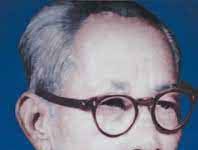G B Shaw | Brief Biography
George Bernard Shaw
G B Shaw | Brief Biography
Once the earth was trodden by a man with an erect strong figure bearing a grey beard and long but half-closed eyes, who in his lifetime became a living legend as a man of exceptionally complex personality as well as one of the most talked of dramatists of exceptionally free ideas—the name of that strange man was George Bernard Shaw.
George Bernard Shaw, the man of wonder was born in Dublin, Ireland in 1856. His father, George Carr Shaw, was the youngest in a family of thirteen children, he, first became a minor official at the law court in Dublin, and later on, became a grain merchant in which he proved himself to be unsuccessful. Moreover, he was a drunkard and incapable of managing the family.
His mother was a daughter of an Irish landowner. She was twenty years younger than her husband. She had a good singing voice and sang for an opera. George Bernard Shaw learned much knowledge of music from his mother.
Shaw had got little chance to go to school. So his education was ordinary enough. For some years only, he had been to school; but he did not like to follow the school routine. Soon, school seemed to him to be a ‘penal servitude’. So he left school when he was hardly fifteen. Though he had not good education, he used to frequent the Irish National Gallery to study the pictures.
As the family was financially unprosperous enough, so George Bernard Shaw had to find a job. Soon he met his fortune and became a clerk and afterward cashier in a land agent’s office till 1876. As his father was a drunkard and inefficient to manage the family, his mother, along with her two daughters, left home and went to London where she devoted herself to music to earn his livelihood. Both his father and mother seemed to take less care of their children. So George Bernard Shaw enjoyed freedom. In the meantime, he left his job as a clerk and went to London, There he joined his mother but received little love from his mother.
In London, he did not allow his hours went idle. There he began to contribute criticism to the journals. First, he wrote criticism on music and then as a critic of plays for ‘The Star ‘and for ‘The Saturday Review’ respectively. His criticisms, which contributed to those journals, were witty based on realism.
As G B Shaw grew older, he became more and more rational and new and strange ideas began to grow in his mind. At the age of twenty-five, he abstained from meat and became a vegetarian. He lost faith in Christism at an early age, as he said that Christism had lost its original path and it, as a religion, became corrupted. But he was not irreligious. He gave value and honour to morality, truthfulness, and simplicity in lifestyle. He himself shunned every kind of luxury. He never took any stimulant which other men took in order to restore spirit or to forget their pain and worries. He never joined any games. He thought walking to be the best exercise for everybody and he himself did the same. He never seemed to be the same person for fifteen minutes together. At one moment, he talked with earnestness about the destiny of the human race on earth, and at the next moment, he changed to talk about certain issues of life with ridicule, burlesque and thus he made his listeners laugh. Shaw had the ability to add sugar to the pill as whenever he found it necessary to call anyone mad or stupid he did it so charmingly that the victim could not make any retort. Shaw was always in favour of social justice and righteousness, but sometimes he was so much freedom in thought that he advocated the freedom of sex. He was against the royal hood and even against democracy. He was against every kind of creed of worship. In short, he was an iconoclast. All those made him exceptionally a man of a complex personality.
By writing criticism, as a critic, to the journals, he earned only a little which was not enough to meet his own expenses. So for the first ten years in London, he depended upon his mother. During his life in London, besides writing criticism, he began to lay the foundation for his future career. He began to attend public meetings, congregation and many social functions. One day in 1884 he went to a meeting where an American economist by the name of Henry George delivered a lecture on the necessity of socialism. He advocated that the national revenue should be raised by a single tax on land values, instead of numerous taxes on a variety of things. His lecture fell a deep influence on Bernard Shaw’s mind. Then he used to frequent the ‘Fabian Society’ that wanted to bring about a gradual evolutionary change, not a sudden and violent one, from capitalism to socialism. There he met Mrs. Annie Besant, who was an ardent supporter of the independence of India. She was a great admirer of Shaw, later on, Shaw was somewhat influenced by Besant when she became the leader of the theosophists. Thus George Bernard Shaw broadened his store of thought. After gathering a new and free outlook on life, George Bernard Shaw took to writing creative literature. His first attempt was in the field of novels and wrote out three novels that were replete with his own free ideas on life. Having the manuscripts with him, he went door to door but found no publisher for his novels. Then he gave up his attempt to write novels and took to writing plays. In the meantime, he studied some plays by Shakespeare, the plays by Henrick Ibsen, and the plays by Anton Chekhov which inspired him to devote himself to playwriting. In 1892, he completed his first play Widower’s House which was performed in London. The play dealt with the evils of London Slums. In this play, he portrayed the unhealthy and exploited condition of the wretched and poor. On such a subject, this play was the first play written in the English language. This play had no success until he wrote ‘Mrs. Warren’s Profession’, ‘Arms and the Man’, ‘The Devils Disciples’ and ‘Candida’. In the meantime in 1898, he married Charlotte Payne Townshed and began to live with her in London and devoted himself earnestly to creating plays of free ideas. In 1904 his plays met success in the stages which brought him both reputation and money enough to live on. Then he became a leader of thought and a champion of intellectual freedom.
As was George Bernard Shaw’s personality so were his plays. His plays were the face of his thoughts and ideas. Though he was inspired by Shakespeare, Ibsen, Chekov and other Irish playwrights, he did not take their model in writing his plays. He wrote absolutely in his own way. He took the realistic theme for his plays representing his own thought and ideas through them. He often said, “The purpose of my writings is to convert my nation into my opinion”. So his plays became his artistic success. The structure of his plays is often marked by the weakness of unity. His characters are not full-fledged, but one-sided which showed their intellect only. The dialogues of his plays are often witty and satiric. So it is reasonable to say that his plays are artistically a failure though the ideas expressed in his plays are worth praising. But it is also reasonable to admit that his ideas are not absolute, they are coloured by his whim and his stubbornness. For example, he advocated the freedom of women. He was in favour of giving equal status to woman as is enjoyed by men, but in the matter of sex and marriage, he advocated free sex and wanted to violate the institution of marriage and family which only a few can support. Biologically, his thought of free sex may be reasonable but socially it is unwholesome because if freedom in the matter of sexual relationship is given, it would beget disorder, indiscipline, and chaos.
His ideas and thoughts expressed through his plays lack generalization for which his new ideas and thought could not fall any permanent impression on the human mind.
In 1935 G B Shaw was awarded the Novel Prize in literature. Though his plays are artistically a failure, yet thematically they are a success. And it is for his realistic theme and ideas, his dramas were at the height of popularity during his later years. Between 1904 and 1907, his eleven plays met more than seven hundred performances. In 1923 he wrote ‘Saint Joan’ which is said to be his best play. It became popular not in England but in America also. Besides, giving new ideas through his plays, he gave a new thing into the art of playwriting that is—a detailed preface that is necessary to understand his plays better. Moreover, his stage direction and the detailed account of his characters given within brackets are new things in plays.
His complex personality, as well as his dramas of new ideas, drew the attention of the general mass so much that his name become a rumour, almost a legend, during his last decades and the world applauded Shaw as the greatest dramatist of his age.
Enjoying great popularity, G B Shaw died in 1950 at the age of ninety-four, contributing as many as fifty-four plays in the storehouse of English plays. 0 0 0
G B Shaw
N.B. The article ‘George Bernard Shaw-Brief Biography’ originally belongs to the book ‘The World Writers-Brief Biographies‘ by Menonim Menonimus.
G B Shaw
Books of Composition by M. Menonimus:
- Advertisement Writing
- Amplification Writing
- Note Making
- Paragraph Writing
- Notice Writing
- Passage Comprehension
- The Art of Poster Writing
- The Art of Letter Writing
- Report Writing
- Story Writing
- Substance Writing
- School Essays Part-I
- School Essays Part-II
- School English Grammar Part-I
- School English Grammar Part-II..
Books of S. Story by M. Menonimus:
Related Search:











